|
|
|
Sort Order |
|
|
|
Items / Page
|
|
|
|
|
|
|
| Srl | Item |
| 1 |
ID:
173790
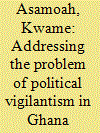

|
|
|
|
|
| Summary/Abstract |
Ghana entered into the Fourth Republic in 1993 after experiencing political instability over two decades. A defining feature that has characterized the Fourth Republic of Ghana and marred Ghana’s democratic credentials is the emergence of political vigilantism. Political vigilantism has basically been perpetuated by the two leading political parties in Ghana: the New Patriotic Party and National Democratic Congress. The major political actors in the political system of Ghana continue to express the debilitating effects of political vigilantism on Ghana’s democratic advancement, nevertheless, it continues to persist in monumental proportion in our political dispensation. Using a qualitative research approach, the paper examines the factors responsible for the pervasiveness of political vigilantism under the Fourth Republic of Ghana and proffer some plausible solutions to address this political canker.
|
|
|
|
|
|
|
|
|
|
|
|
|
|
|
|
| 2 |
ID:
156545
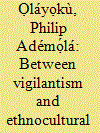

|
|
|
|
|
| Summary/Abstract |
Postmodern contradictions in postcolonial Nigeria have led to the fetishisation of alternative local security measures often labelled as vigilante activities. The profiling of these groups as ethnic militia often undermines their essential bid to provide security while delimiting security needs to the physical. The fallouts of such profiling are frictions between federal security agents and ethnic-based security groups, often resulting in violence, as exemplified by the 7 May 2013 incident between the Nigerian federal security agents and the Ombatse. This study focuses on the emergence and activities of the Ombatse as an alternative security apparatus of the Eggon. It presents three years of field research which entailed the use of ethnography, key informant interviews and observation. The findings reveal that the Ombatse emerged to assert historical legitimacy for both the physical and spiritual securitisation of the Eggon through a return to the ancestral ways of social engineering. The study considers the security challenges in Nigeria, and also situates the Eggon historical context within political, religious, sociocultural and economic intersections of securitisation. It concludes that the Ombatse situates its legitimacy within the Eggon past and retains its relevance through the holistic focus of providing both physical and spiritual security.
|
|
|
|
|
|
|
|
|
|
|
|
|
|
|
|
| 3 |
ID:
125599
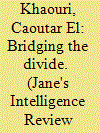

|
|
|
|
|
| Publication |
2013.
|
| Summary/Abstract |
The Islamist secular divide in Tusia has deepended in the midst of the deteriorating security situation, affecting democracy. Caoutar El Khaouri examines the likely outcome of the political crisis and the threat coming from Islamist -derived terrorisms
|
|
|
|
|
|
|
|
|
|
|
|
|
|
|
|
| 4 |
ID:
077389
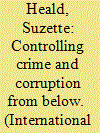

|
|
|
|
|
| Publication |
2007.
|
| Summary/Abstract |
This article deals with the history and development of sungusungu organisations in Kenyan Kuria from 1998 to the present time and the radical changes it has initiated. Developing out of indigenous organisation, sungusungu arose initially to provide a means of controlling theft, particularly cattle raiding. Operating with the sanction of the district administration, local norms of crime, trial and punishment were developed, distinct from those embodied in the national penal code. Guarding their independence, groups have kept their distance from the police and judiciary to avoid the systemic corruption of those institutions. In distancing themselves from the more corrupt aspects of the state, and acting against it within their areas of operation, these groups have had far-reaching effects on local security, to the extent that their success holds out possibilities for them to extend their activities into other spheres.
|
|
|
|
|
|
|
|
|
|
|
|
|
|
|
|
| 5 |
ID:
158942
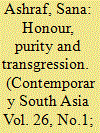

|
|
|
|
|
| Summary/Abstract |
Since the incorporation of anti-blasphemy laws protecting the religious sentiments of the Muslim majority in the Pakistan Penal Code in the 1980s, Pakistan has seen several cases of extra-judicial killings, mob violence and vigilante action against the accused. Based on my fieldwork in Punjab, Pakistan, this paper deals with the meanings associated with blasphemy, and violent action that follows the accusations. Focusing on everyday interactions at a local level, I argue that certain understandings of the notions of honour, shame, purity, and transgression provide meaning as to what constitutes blasphemy and what are desirable courses of action to be taken in response to perceived blasphemy. I further demonstrate how public religious discourse is utilized to mobilize people, by actively legitimizing violence in the name of love, and framing as the hero – a true Muslim – one who can kill for the sake of love and hence is capable of preventing shame by defending the Prophet’s honour.
|
|
|
|
|
|
|
|
|
|
|
|
|
|
|
|
| 6 |
ID:
131542
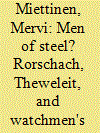

|
|
|
|
|
| Publication |
2014.
|
| Summary/Abstract |
Watchmen (1987), written by Alan Moore and illustrated by Dave Gibbons, is a 12-part graphic novel that portrays real-life superheroes in a fictional United States of the 1980s. An alternate universe where ordinary people without superpowers were inspired by superhero comics and took on the crime-fighting in tights in the 1940s, the comic portrays an America vastly different from our reality. Since its publication more than two decades ago, the comic has been the subject of extensive study due to its breathtaking narrative structure as well as its acute deconstruction of the superhero genre itself. Indeed, one of the text's most brutal deconstructions comes from the way it addresses superheroic masculinity, from the misogynistic vigilante Rorschach to the emasculated ex-hero Nite Owl. Through its cast of male heroes, Watchmen deconstructs the superhero genre by rewriting masculine tropes such as vigilantism and patriotism and by exposing the inherent contradictions within these gender-bound tropes from the fascist undercurrents of violent patriotism to the often-hinted sexual dysfunction of the costume-fetish variety.
|
|
|
|
|
|
|
|
|
|
|
|
|
|
|
|
| 7 |
ID:
188573
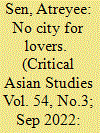

|
|
|
|
|
| Summary/Abstract |
This article explores the quotidian politics of women’s virtue vigilante groups in Mumbai. It illustrates the multiple ways in which lower class “respectable women,” ranging from members of ladies’ groups to lone-wolf leaders, actively participate in cleansing the cityscape of what they believe is “sexual vulgarity” by daily surveillance over public displays of love in poor and peripheral localities. This militant scrutiny of urban public conduct is intimately related to daily security anxieties about those they label as perverts, sex addicts, and pedophiles occupying urban areas, which are still safe spaces for less affluent women and children. These women’s groups and their resilient/adaptable moral authority in the management of public space offer imperceptible and enduring challenges to the hegemony of police governance over such urban spatial orders.
|
|
|
|
|
|
|
|
|
|
|
|
|
|
|
|
| 8 |
ID:
139632
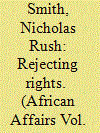

|
|
|
|
|
| Summary/Abstract |
Academic and policy interest in the emergence, development, and efficacy of rights has increased substantially over the last twenty years. One particular effect that scholars have recently identified is the connection between the spread of rights across the globe and large-scale reductions in violence. While the expansion of rights may enable reductions in violence, the evidence in this article suggests the opposite may also be true. Drawing on ethnographic research on vigilantism in South Africa, a country deeply invested in the twentieth century rights revolution, the article shows how vigilantes have used the state's expanding rights regime to justify violence. Specifically, it examines the growth and spread of what was at one time South Africa's largest vigilante group, Mapogo a Mathamaga. Mapogo first emerged shortly after the country's transition to democracy and rapidly grew as its leadership preached a gospel that rejected rights, claiming that rights enabled crime and allowed immorality to proliferate. By assaulting suspected criminals, Mapogo's members claim that they are correcting the criminal, the post-apartheid state, and the flawed rights regime on which it is based, an outcome which the existing literature on rights and violence has difficulty explaining.
|
|
|
|
|
|
|
|
|
|
|
|
|
|
|
|
| 9 |
ID:
080881
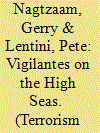

|
|
|
|
|
| Publication |
2008.
|
| Summary/Abstract |
Defining terrorism and explaining how it occurs remains a contentious issue. This article attempts to generate new understandings on these topics by applying the work of Ehud Sprinzak's delegitimatization model to the Sea Shepherds. Evidence presented in the article suggests that the Sea Shepherd's present level of political violence passed through gradual phases. In this respect, it is possible to suggest that Sprinzak's model has applicability for maritime organizations, as well as terrestrial based groups. However, we also note that on the one hand, it may be possible to argue that in some respects the Sea Shepherds may constitute either a "blind spot" in the literature on terrorism and political violence, because its actions could in some circumstances be considered activism, militant direct action, piracy, vigilantism, terrorism, or eco-defense, which makes it very difficult to classify. On the other hand, that both the Sea Shepherds and the whalers may both engage in illegal activities, but are not prosecuted, may indicate that states and the international community may have neither the will nor the means to enforce laws against them. Therefore, they may be turning a blind eye to their actions. Throughout the article we maintain that the Sea Shepherds constitute an example of a gray area phenomenon. Despite the ambiguity surrounding their legal status and academic interpretations of their actions, the results of nearly three decades of the organization's activities, including its 2007 campaign to disrupt Japanese Antarctic Whaling, suggest that the Sea Shepherds may be best categorized as a vigilante group, because they claim they are seeking to enforce a legal status quo because of states' and the international community's inabilities or unwillingness to do so.
|
|
|
|
|
|
|
|
|
|
|
|
|
|
|
|
|
|
|
|
|